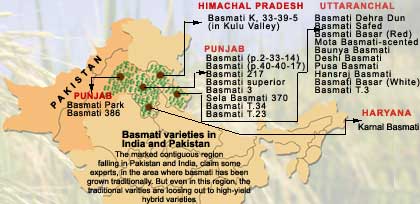Neighbour`s envy, Pakistan`s rice
 Pakistan, claim some experts, is where basmati originated. Today Pakistan is the other big player in the international basmati trade. Two players and a huge playground - that's the story of basmati. And the two players can develop policies and strategies to maintain their niche. Though, in this high stakes game, the loss of one always transforms into profits for the other. Pakistan in a number of ways scores over India. The volume of exports from both countries is a clear proof that the former has gained a huge stake in the market as compared to India. Reasons vary:
Pakistan, claim some experts, is where basmati originated. Today Pakistan is the other big player in the international basmati trade. Two players and a huge playground - that's the story of basmati. And the two players can develop policies and strategies to maintain their niche. Though, in this high stakes game, the loss of one always transforms into profits for the other. Pakistan in a number of ways scores over India. The volume of exports from both countries is a clear proof that the former has gained a huge stake in the market as compared to India. Reasons vary:
• In Pakistan the landholdings are larger, hence the yields are better;
• The government has a clear focused agenda to export quality basmati;
• Pakistan has developed a strategy to get better access to EU markets than India does.
The thrust on basmati is much more than that in India. "This is an offshoot of the fact that basmati constitutes a sizeable fraction of their total exports. In a clear bid to keep up the quality of their produce, Pakistan has also created a Basmati zoning area," says R S Seshadri, director of United Riceland, a leading exporter of basmati from India. No one is allowed to grow basmati beyond this region. The zoning area covers the region where basmati has been grown traditionally. Besides, the traders are expected to label the variety sold. Such a system does not exist in India.
At one level, India now needs to work with its competing neighbour. Experts point out, that if the geographical appellation of basmati in India does not accept that regions in Pakistan are traditional basmati regions as well, then India will weaken its defense of the basmati trade. Similarly Pakistan, needs to join forces and agree that basmati is a traditional produce of India. Together, they might survive, divided, the ship, carrying the two countries' exports to gulf and EU, is bound to sink.
Basmati varieties in India and Pakistan
The marked contiguous region falling in Pakistan and India, claim some experts, is the area where basmati has been grown traditionally. But even in this region, the traditional varities are loosing out to high-yield hybrid varieties
